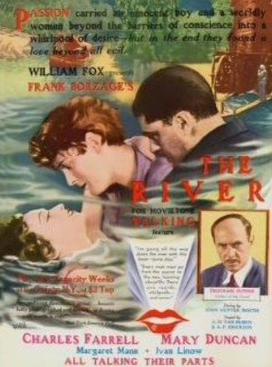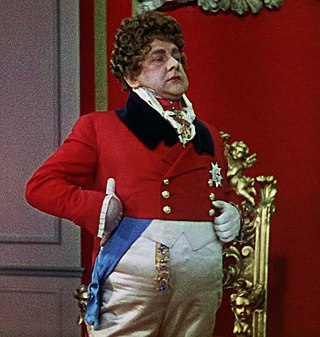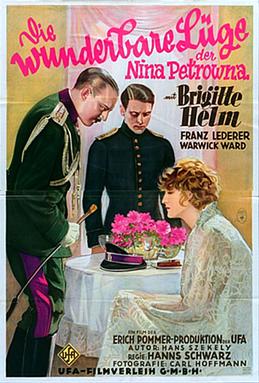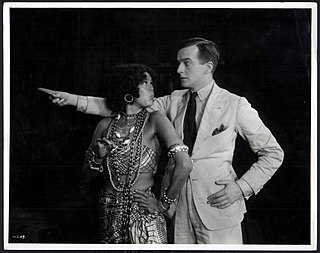Related Research Articles

Sunrise: A Song of Two Humans is a 1927 American synchronized sound romantic drama directed by German director F. W. Murnau and starring George O'Brien, Janet Gaynor, and Margaret Livingston. While the film has no audible dialog, it was released with a synchronized musical score with sound effects using the Movietone sound-on-film process. The story was adapted by Carl Mayer from the short story "The Excursion to Tilsit", from the 1917 collection with the same title by Hermann Sudermann.

The Iron Mask is a 1929 American part-talkie adventure film directed by Allan Dwan. In addition to some sequences with dialogue, the film featured a synchronized musical score with sound effects and a theme song.

Show Boat is a 1929 American pre-Code sound part-talkie romantic drama film based on the 1926 novel Show Boat by Edna Ferber. The film initially did not use the 1927 stage musical of the same name as a source, but scenes were later added into the film incorporating two of the songs from the musical as well as other songs. Many of these songs from the stage show were featured in a special prologue that was added to the picture before it was released. This film was produced and released by Universal. Like the majority of films during the early sound era, a silent version was made for movie theatres that had not yet converted to sound.

The Godless Girl is a 1928 American sound part-talkie dramatic directed by Cecil B. DeMille. In addition to sequences with audible dialogue or talking sequences, the film features a synchronized musical score and sound effects along with English intertitles. The soundtrack was recorded using the RCA Photophone sound-on-film system. The cast features Lina Basquette, Marie Prevost, Tom Keene, and Noah Beery.
Phonofilm is an optical sound-on-film system developed by inventors Lee de Forest and Theodore Case in the early 1920s.

The River is a 1929 sound part-talkie drama film directed by Frank Borzage, and starring Charles Farrell and Mary Duncan. In addition to sequences with audible dialogue or talking sequences, the film features a synchronized musical score and sound effects along with English intertitles. The soundtrack was recorded using the Movietone sound-on-film system. Much of the film has been lost. A reconstructed version with the about 45 minutes of surviving film, using still images and explanatory titlecards to bridge the missing scenes, was produced by the Munich Filmmuseum, in collaboration with the cinémathèques of Switzerland and Luxembourg. This version was screened in 2006 by the American Museum of the Moving Image in New York City. Borzage also directed Farrell, opposite Janet Gaynor, in Seventh Heaven (1927), Street Angel (1928), and Lucky Star (1929) during this period.

The Scarlet Coat is a 1955 American historical drama and swashbuckler in Eastmancolor and CinemaScope released by Metro-Goldwyn-Mayer, produced by Nicholas Nayfack, directed by John Sturges. It stars Cornel Wilde, Michael Wilding, George Sanders, and Anne Francis. The film is based upon the events in the American Revolution in which Benedict Arnold offered to surrender the fort at West Point to the British in exchange for money.

Olaf Hytten was a Scottish actor. He appeared in more than 280 films between 1921 and 1955. He was born in Glasgow, Scotland, and died in Los Angeles, California from a heart attack, while sitting in his car in the parking lot at 20th Century Fox Studios. His remains are interred in an unmarked crypt, located in Santa Monica's Woodlawn Cemetery.

Bulldog Drummond Strikes Back is a 1934 American comedy-mystery-adventure film directed by Roy Del Ruth. The film stars Ronald Colman and Loretta Young. It was a loose sequel to the 1929 film Bulldog Drummond which had also starred Colman.
Spread a Little Happiness" is a song by the musical comedy composer Vivian Ellis and writer Clifford Grey from their 1929 West End musical Mr. Cinders. In the original production it was sung by Binnie Hale as the character Jill Kemp; a recording of her performance of the song was released by Columbia in 1929.

Man of Conquest is a 1939 American Western film directed by George Nicholls Jr. and starring Richard Dix, Gail Patrick, and Joan Fontaine. The film was nominated for three Academy Awards for Best Score, Best Sound, and Best Art Direction.
Murder at Covent Garden is a 1932 British crime film directed by Leslie S. Hiscott and starring Dennis Neilson-Terry, Anne Grey, George Curzon and Walter Fitzgerald. It was made at Twickenham Studios. The screenplay involves a detective who investigates the murder of a night club owner.

Albert Préjean was a French actor, primarily in film. He served in World War I, and was decorated with the Croix de Guerre and the Legion d'honneur. With Lysiane Rey, he was the father of Patrick Préjean, and grandfather of Laura Préjean.

Kitty is a 1929 sound part-talkie British drama film directed by Victor Saville and starring Estelle Brody and John Stuart. In addition to sequences with audible dialogue or talking sequences, the film features a synchronized musical score and sound effects along with English intertitles. The film was adapted from the 1927 novel of the same name by Warwick Deeping and marked the third co-star billing of Brody and Stuart, who had previously proved a very popular screen pairing in Mademoiselle from Armentieres (1926) and Hindle Wakes (1927).
Cupid in Clover is a 1929 British sound romance film directed by Frank Miller and starring George Wynn, Winifred Evans and Herbert Langley. While the film has no audible dialog, it features a synchronized musical score with sound effects along with a theme song. The film was adapted from the novel Yellow Corn by Upton Gray and made at Isleworth Studios in London.

The Wonderful Lies of Nina Petrovna is a 1929 German sound drama film directed by Hanns Schwarz and starring Brigitte Helm, Francis Lederer and Warwick Ward. While there is no audible dialogue in the film, the soundtrack features a synchronized musical score with sound effects along with a theme song. It was the last big-budget film without dialogue released by the leading German studio Universum Film AG before the transition to sound began with Melody of the Heart. The film premiered on 15 April 1929 at the Ufa-Palast am Zoo in Berlin. It was amongst the most popular films released in Germany that year. A sound version was prepared for English speaking audiences. While the sound version has no audible dialog, it features a synchronized musical score with sound effects along with a theme song.

The Man and the Moment is a formerly lost 1929 sound part-talkie romantic comedy film directed by George Fitzmaurice and starring Billie Dove. In addition to sequences with audible dialogue or talking sequences, the film features a synchronized musical score and sound effects along with English intertitles. The soundtrack was recorded using the Vitaphone sound-on-disc system. The film survives in a copy of the International Sound Version. The sound of the domestic part-talkie version was synchronized to the surviving print of the international sound version. Because of this, many scenes feature intertitles shown immediately after the spoken dialogue conveying the same words. The talking sequences on the international sound version were muted with music and intertitles were inserted to convey the dialogue replaced in the appropriate foreign language. Therefore, intertitles were left in the talking sequences during the restoration to maintain synchronization with the Vitaphone soundtrack. The story is from a 1914 novel by Elinor Glyn, the famous novelist. The film was produced by Richard A. Rowland and released by First National Pictures. A British silent film had been film of the same story in 1918.

Spy Ship is a 1942 American Warner Bros. B picture drama film directed by B. Reeves Eason and written by Robert E. Kent. The film, a remake of Fog Over Frisco that was based on the short story The Five Fragments by George Dyer stars Craig Stevens, Irene Manning, Maris Wrixon, Tod Andrews, Peter Whitney and John Maxwell. The film was released by Warner Bros. on June 6, 1942.

Strange Wives is a 1934 American comedy film directed by Richard Thorpe, written by James Mulhauser, Barry Trivers, and Gladys Buchanan Unger, and starring Roger Pryor, June Clayworth, Esther Ralston, Hugh O'Connell, Ralph Forbes, and Cesar Romero. It was released on December 10, 1934, by Universal Pictures.

White Cargo is a 1930 sound part-talkie British drama film directed by J.B. Williams and starring Leslie Faber, John F. Hamilton and Maurice Evans. While the film has a few sequences with audible dialog, the majority of the film featured a synchronized musical score with sound effects. The majority of the film was photographed at Twickenham Studios, while the talking sequences were filmed at Whitehall Studios, Elstree which were wired for sound recording.